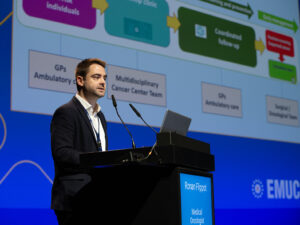The inaugural session of the EAU Section of Urological Imaging programme, Plenary Session 1 “Prostate cancer screening” provided the current evidence in screening programmes such as trials Swedish Organised Prostate Cancer Testing (OPT), PROBASE and TRANSFORM, as well as the Prostate cancer Awareness and Initiative for Screening in the European Union (PRAISE-U).
Swedish OPT
Dr. Rebecka Arnsrud Godtman (SE) presented “The Swedish experience – 4 years of OPT” which focused on the population-based, screening-like programme with a pre-defined algorithm.
Dr. Godtman provided the results of the OPT from 2020 to 2023 which involved men aged 50 to 55. Out of almost 140,000 invitations sent, participation was at 34%. Compliance of participants involving MRI and biopsy was high. Results of the 1,373 MRIs showed PI-RADS 1 to 2 was at 68%, PI-RADS 3 at 19%, and PI-RADS 4 to 5 at 12%. Of the 440 biopsies performed, 42% were benign, 19% had Gleason score 6, 32% had Gleason score 7, 5% had Gleason score 8 to 10, and 2% had no Gleason score.
Dr. Godtman also shared five key learning experiences:
- Planning is essential. To estimate flows and necessary resources, simulation models should be developed. Before starting, the necessary resources for all diagnostic steps and treatment should be secured. To test infrastructure and identify pitfalls, carry out a pilot project (not too small) or start stepwise.
- A change of perspective – the OPT philosophy. An algorithm that minimises individualisation that reaches dichotomous algorithm outcomes must be established.
- Communication is key. Constant contact with all stakeholders is crucial. Involve professional communicators and the target population. Persuading people to comprehend and comply is a complex task.
- Building the first round of the algorithm is easy but the subsequent ones are increasingly difficult.
- Register, analyse, and provide feedback on all outcomes.
PROBASE
In “The German experience: PROBASE trial”, presenter Prof. Peter Albers (DE) concluded that risk-adapted organised screening such as in PROBASE is a valid strategy because baseline prostate-specific antigen (PSA) in young men (aged 45 to 50) works and is recognised. Furthermore, he stated, “Baseline PSA is important and it is currently the best way to prevent prostate cancer mortality. However, you have to stay away from further investigations if you have low PSA.”
Prof. Albers added that baseline PSA reduces harm for men who are not at risk or low risk. It prevents opportunistic screening with reduced screening intervals (every 5 years). He added that if started early (45 to 50 years of age), it is probable that all relevant cancers will be detected, and with personalised treatment such as active surveillance, harm will further diminish. However, challenges remain such as the beginning and end of screening, as well as the quality of MRIs.
In the next few years, PROBASE aims to determine if AI will improve MRI reading; whether serum/urine biomarkers can be used before MRI; how to increase the acceptance of screening; and if there are sociodemographic differences.
TRANSFORM
The TRANSFORM trial is anticipated to be the biggest trial in prostate cancer (PCa) screening aimed to determine the best way to screen in a 20-year timeframe. The trial has been developed in consultation and support of the National Health Service (NHS), the National Institute for Health and Care Research (NIHR) and the UK Government.
In his presentation, “The British programme: TRANSFORM trial”, Prof. Mark Emberton (GB) discussed the three stages of the trial:
- Stage 1 will pilot new screening interventions and evaluate how to deliver a pivotal trial by accessing key trial processes and assumptions.
- Stage 2 will conduct the pivotal clinical trial and create a biobank with clinical and imaging data alongside a fluidic, histological and tissue archive.
- Stage 3 will evaluate long-term primary outcomes from the trial through linkage to national databases.
Prof. Emberton stated, “We have agreed on the design of a new prostate cancer screening study. It’s a fantastic achievement. The funding for Phase 1 is in place. The trial has support from the NIHR and the UK government, this may encourage other international groups to adopt complementary designs.”
PRAISE-U
A project aimed at reducing morbidity and mortality caused by PCa in the EU, PRAISE-U focuses on early detection, protocol alignment, data collection, risk-based approach, and knowledge sharing. The initiative is a consortium of 25 institutions from 12 member states.
“PRAISE-U: Updates from the pilot studies (Work Package 2)” by Dr. Katharina Beyer (NL) showed that the screening strategy in the pilots currently involves countries Lithuania, Spain (Galicia and Manresa), Poland, and Ireland. Since the initiative has only been in place for a few months, more information is to be expected. Invitations have been sent to potential participants in Galicia, Manresa and Poland.
Dr. Beyer stated that PRAISE-U is “building current knowledge on a long road of screening history in PCa, and important insights are being acquired and action will be taken (i.e., risk-based screening). PRAISE-U offers a new opportunity to apply fresh learnings and aims for more understanding outside the trial setting.”
Prof. Albers and Chair of the EAU Section on Urological Imaging Prof. Francesco Sanguedolce (ES) spearheaded the Plenary Session.
To watch the full presentations, please visit the EMUC24 Resource Centre.




